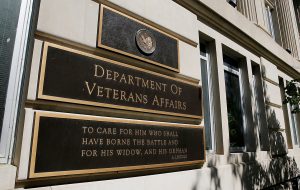WASHINGTON (OSV News) – The U.S. Department of Veterans Affairs finalized March 6 its interim policy permitting abortion at VA hospitals and clinics when there is risk to the mother’s life or in cases of rape or incest.
The final rule, published in the Federal Register, which also permits abortion counseling and procedures at VA facilities regardless of state restrictions, was criticized by Catholic leaders, including Archbishop Timothy P. Broglio of the U.S. Archdiocese for the Military Services.

The White House said that when “working within the scope of their federal employment,” VA health care workers “may provide abortion services as authorized by federal law regardless of state restrictions.”
Supporters of the provision argued female service members may be assigned to states that have restricted abortion, and that their access should be protected in difficult circumstances. Opponents argued the department exceeded its authority.
In a March 7 statement, Archbishop Broglio said the VA “has finalized an interim rule that permits abortion counseling and abortive procedures in VA Medical Centers through all nine months of pregnancy.”
“The notion that killing an unborn child can somehow be considered ‘medical or surgical care’ certainly violates the dignity of the human person and suggests that some lives are more important than others,” he said. “I deplore this decision that once more removes the right to life for the defenseless and inflicts untold physical and psychological trauma on mothers.”
The Catholic Church opposes abortion, outlining its teaching in the Catechism of the Catholic Church that human life “must be respected and protected absolutely from the moment of conception.” Because abortion takes the life of an already conceived child, it is “gravely contrary to the moral law,” the catechism says.
The Ethical and Religious Directives for Catholic Health Care Services, which are used by Catholic medical providers, reflect that teaching; that document, while forbidding direct abortions, also permits procedures where the “direct purpose” is to save the mother’s life and “cannot be safely postponed until the unborn child is viable, even if they will result in the death of the unborn child.”
Abortion supporters applauded the VA rule’s finalization. Fatima Goss Graves, president and CEO of the National Women’s Law Center, said in a statement, “Access to abortion is necessary for the health and safety of veterans – and for all people – to determine their futures.”
“We’re thrilled that VA has taken this critical action for veterans seeking abortion care and counseling,” she said. “At a time when extremists are cruelly attacking reproductive rights across the nation, safeguarding access to abortion care for veterans and their loved ones is paramount. Our policymakers should be protecting our rights, not trying to strip them away.”
But Archbishop Broglio noted the U.S. Catholic bishops “raised multiple objections” to the rule, arguing it violates “section 106 of Veterans Health Care Act” which “specifically limits abortion.”
“The VA’s decision is at odds with the notion that the military protects the innocent,” he added. “Now, the Department which was established to care for Veterans of the United States Armed Forces through service-related disabilities and retirement, affirms its decision to join what Pope Francis called ‘hit men’ — those who choose ‘to do away with a human life to solve a problem.'”
He added, “It is expected that the Department of Veterans Affairs will at least respect the conscience rights of medical personnel, staff, and other employees and permit them to abstain from any involvement in immoral procedures.”
The VA reported that it received 57,901 comments on the rule during a 30-day window for the public to submit them, both in support and opposition.
The rule is scheduled to go into effect April 3, 2024.
